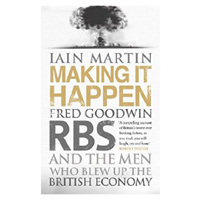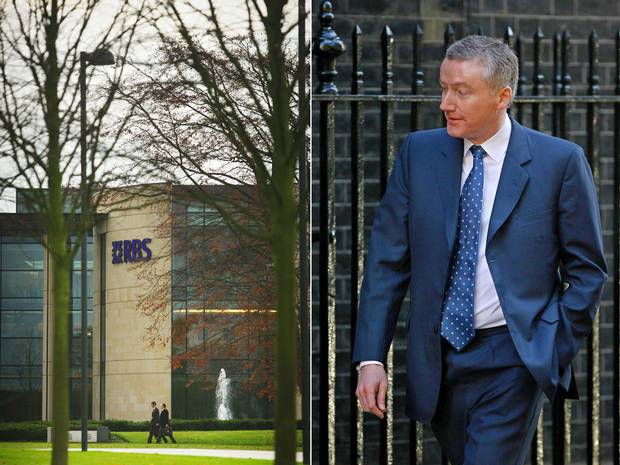 When RBS collapsed and had to be bailed out by the taxpayer in the financial crisis of October 2008, it played a leading role in tipping Britain into its deepest economic downturn in seven decades. The economy shrank, bank lending froze, hundreds of thousands lost their jobs, living standards are still falling and Britons will be paying higher taxes for decades to pay the clean-up bill. How on earth had a small Scottish bank grown so quickly to become a global financial giant that could do such immense damage when it collapsed?
When RBS collapsed and had to be bailed out by the taxpayer in the financial crisis of October 2008, it played a leading role in tipping Britain into its deepest economic downturn in seven decades. The economy shrank, bank lending froze, hundreds of thousands lost their jobs, living standards are still falling and Britons will be paying higher taxes for decades to pay the clean-up bill. How on earth had a small Scottish bank grown so quickly to become a global financial giant that could do such immense damage when it collapsed?
At the centre of the story was Fred Goodwin, the former chief executive known as “Fred the Shred” who terrorised some of his staff and beguiled others. Not a banker by training, he nonetheless was given control of RBS and set about trying to make it one of the biggest brands in the world.
It was said confidently that computerisation and new banking products had made the world safer. Only they hadn’t…Based on more than 80 interviews and with access to diaries and papers kept by those at the heart of the meltdown, this is the definitive account of the RBS disaster, a disaster which still casts such a shadow over our economy.
In Iain’s Martin’s “Making It Happen: Fred Goodwin, RBS and the Men Who Blew Up the British Economy“, senior executives, board members, Treasury insiders and regulators reveal how the RBS’ mania for expansion led it to take enormous risks its leaders didn’t understand. From the birth of the Royal Bank in 18th century Scotland, to the manic expansion under Fred Goodwin in the middle of a mad boom and culminating in the epoch-defining collapse, Making It Happen is the full, extraordinary story.
Iain Martin tells it brilliantly, mixing fury-inducing narrative with an acute eye for the broader conclusion. This is a compelling tale about the global financial crash filled with villains, victims and economic horrors. The former editor of the Scotsman newspaper paints a picture of Fred as a man obsessed with minutiae – from office hygiene to the designs of Christmas cards – at the expense of the responsible strategic management of a world-leading investment bank.
One close collaborator, quoted by Iain Martin in the Sunday Times said: “The job of chief executive wasn’t really done by him in the normal sense of someone trying to strategise properly and see the dangers and opportunities ahead. He was obsessed with all sorts of small details and measuring things and all sorts of minutiae and crap in certain parts of the business … We would spend hours in meetings discussing the wrong things. Colours for advertising campaigns, computer systems and targets were what grabbed him.”
But what role did the obsessive streak in Goodwin’s character play in RBS’ eventual downfall?
Professor Malcolm Higgs, a leading occupational psychologist at the University of Southampton, told The Independent it certainly can’t have helped matters.
“You occasionally find this narcissistic tendency in CEOs,” he said. “They want to control everything, they don’t want to know that they’re not perfect. It’s not conducive to successful leadership of a company.”
Lehman Brothers boss Dick Fuld had similar tendencies, Professor Higgs said.
“The big question is: how do these ‘corporate psychopaths’ get to the top? They’re actually quite engaging people, they can appear very visionary. But they can’t take any negative feedback, so they lose contact with reality.”
“Being focused on detail and getting things just right might have been a useful trait when he was working at a lower level,” said Emma Donaldson-Feilder, occupational psychologist and director of consultants Affinity Health at Work, which specialises in workplace leadership and management.
“But you’ll find that as people go higher up an organisation, the things that were actually strengths at lower levels become over-used and high-risk…. It sounds likes Fred Goodwin became obsessive and that took his attention away from things that were much more important.”
 The diagnosis matches other symptoms that Goodwin demonstrated after rising to the top of RBS in 2001. Iain Martin writes of how, like many a doomed leader, he obsessed over a grand project – RBS’ glimmering new headquarters at Gogarburn, outside Edinburgh.
The diagnosis matches other symptoms that Goodwin demonstrated after rising to the top of RBS in 2001. Iain Martin writes of how, like many a doomed leader, he obsessed over a grand project – RBS’ glimmering new headquarters at Gogarburn, outside Edinburgh.
Alarm bells should have rung for anyone close to Goodwin. According to Prof Higgs, managers and leaders who give meticulous attention to minor details are often over-compensating for a very deep insecurity that on another, more serious level, they really don’t feel in control at all.
“There’s a huge difference between attention to detail and obsessive control and it sounds like he had the latter,” Prof. Higgs said. “If he’d paid more attention to some of the deals they were making, they may not be in the state they are in now. There is fundamental self-insecurity behind it. If somebody is obsessive about controlling minor details – then it’s time to worry.”
| Title | Making It Happen: Fred Goodwin, RBS and the Men Who Blew Up the British Economy |
| Author | Iain Martin |
| first published | March 6th, 2012 |
| Publisher | Simon & Schuster UK |
| ISBN | 1471113566 |
| Language | English |
